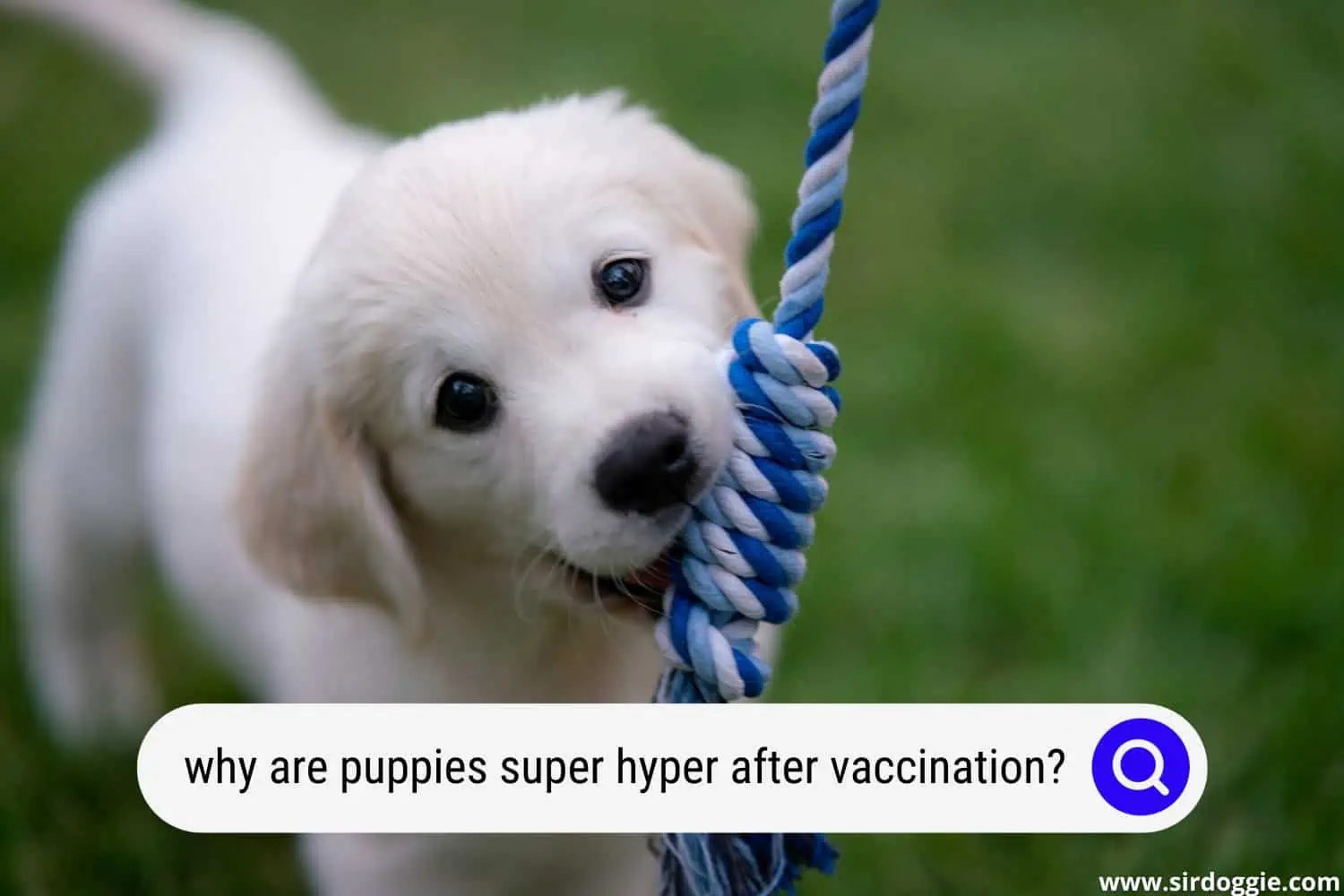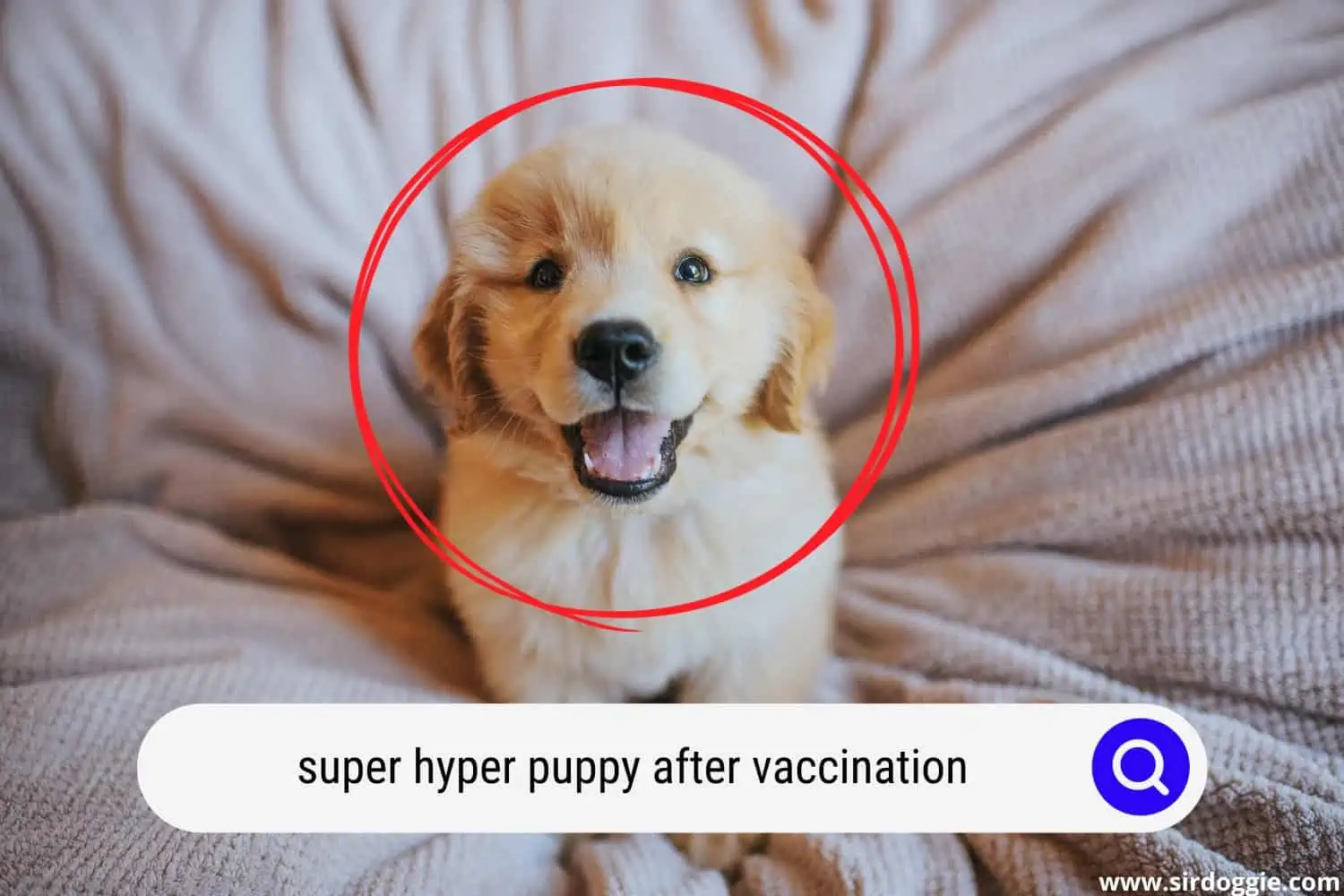Why Are Puppies Super Hyper After Vaccination?
When it comes time for your puppy’s vaccines, you may be feeling a bit anxious about how well he’ll handle the whole process. After all, a visit to the vet is already a frightening experience for most dogs, and inserting needles into the equation usually just makes things worse. Vaccinations, on the other hand, are a good thing and essential for your pet’s overall health.

Sometimes, puppies may show hyperactive behavior before even getting their vaccinations because a trip to the vet can be a bit stressful when young dogs aren’t yet used to the experience, and this stress from an unfamiliar situation will cause them to seem more energetic and wild.
When pups react this way, whether due to the vet visit or the shots themselves, this behavior change usually lasts only a few hours at most. If your dog doesn’t begin to calm down within a short period, contact your veterinarian right away to schedule an appointment. This may be a sign of distress or a red flag regarding your pup’s ability to safely process the side effects of getting a vaccine.
Additionally, never massage the area where the vaccination has been administered. You should wait 24 to 36 hours before gently rubbing him down and checking for any painful locations. These spots are delicate after vaccination and your pup’s immune system will already be targeting those areas and triggering inflammation—you do not want to worsen this response and make your pup more uncomfortable.
When it comes to puppies having a response to their vaccines or scary vet visits, some pups are more stoic than others, and they may show no signs of distress at all or suffer silently if they’re scared or uncomfortable. Alternatively, some puppies are tiny drama queens who will get stressed and throw a complete fit even if they’ve had no harm occur to them. During these times, your dog’s personality shows through, allowing you to get to know your puppy even better.
Although vaccination may be distressing, being thrown off a bit and having a change in behavior for a short while is natural for your puppy in these circumstances, and they will be energetic and joyful again in a matter of days.
Related Reading: Vizsla Puppy Vaccinations Guide
Possible Behavioral Changes Along with Hyperactivity
Following immunization, several behavioral changes—as well as hyperactivity—may occur in pups. These changes typically include the following behaviors:
- Puppies may shake after vaccination: When you witness a shaking dog, it might be disturbing since it quickly conjures up images of catastrophic disorders such as seizures or epilepsy.
In reality, shaking is simply a technique for your puppy to communicate that they are experiencing some level of discomfort, which in this case was a result of the injection.
- Puppies may become sluggish after vaccination: A puppy will often get drowsy after receiving vaccinations since their body actively begins to fight off the vaccine’s “ingredients” via an immune response. This is a natural reaction since vaccinations are created to introduce a weakened version of a virus into the body to encourage your puppy to generate antibodies to combat the particular infection and resist it in the future.
As a result, they will be weaker and have less energy to engage in other activities. - Puppies may cry after vaccination: Another typical reaction you may see in your puppy after vaccination is constant crying, which may even last while they are asleep! Pups may experience severe pain following the shot, and their screaming may serve as a signal to you that they are not feeling well.
The vaccine shots a puppy receives can be a little uncomfortable, especially if given intramuscularly (into a muscle) rather than subcutaneously (into the layer underneath the skin).

Some Side Effects of Puppy Vaccination
The adverse effects of a puppy’s first vaccination begin to manifest themselves within minutes or hours after the vaccine, and those effects may linger for up to 24 hours.
The way a puppy reacts to vaccinations is determined by both its immune system and its personality.
All of the symptoms should, however, be minor and unconcerned. You should take your puppy back to the doctor after three days if any symptoms are still there. This will allow the physician to determine what went wrong.
If your pup exhibits any of the following symptoms at any stage after receiving their immunizations, you need to take them to the veterinarian immediately:
- Skin rashes
- Extreme weakness
- Loss of consciousness
- Recurring diarrhea
- Swollen face
- Collapsing
- Difficulty breathing
- Persistent vomiting
Please remember that the above-mentioned symptoms on the list are quite uncommon and are signs of a serious allergic reaction. After getting vaccinated, most pups go through an initial stage of moderate symptoms, but they are often entirely okay within 24-48 hours. On the other hand, if these symptoms worsen, it might be an indication of an allergic response to something in the vaccines.
As a result, there is no method to predict which dogs are allergic or will even become allergic to anything before they have an actual adverse immune response, and hence, there is no way to prevent this type of response from occurring. However, the overall percentage of adverse effects from any vaccines a puppy receives is relatively low.
Related Reading: Vizsla Puppy Behavior

Family Dog Expert Author
Hi there! I’m Stuart, a devoted dog lover and family dog expert with over a decade of experience working with our furry companions. My passion for dogs drives me to share my knowledge and expertise, helping families build strong, loving bonds with their four-legged friends. When I’m not writing for SirDoggie, you’ll find me hiking, playing with my beautiful dog, or studying music.